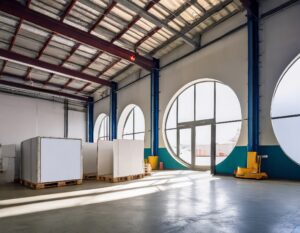Page Contents
- Overview of the Dallas-Fort Worth Industrial Market
- Growing Pains and Vacancy Rate Increase
- Slowing Demand and Rising Availability Rates
- Lease Volume Trends and Population Growth
- Vacating Large Spaces
- Semiconductor Industry’s Impact
- Strong Rent Growth Amid Market Dynamics
- Rent Growth Led by Logistics Hubs
- Submarket Rent Growth Variances
- Significant Lease Deals Impacting Rent Levels
- Near-Term Outlook for Rent Growth
- Largest Industrial Pipeline in the Country
- Record Deliveries and Rising Availability
- Construction Pace and Financing Challenges
- Key Submarkets in Construction
- Kaufman County: The New Industrial Frontier
- Slowing Capital Markets for Industrial Properties
- Portfolio Transactions Boosting Deal Activity
- TreeHouse Foods’ Acquisition and Facility Relocation
- Closing Thoughts
Overview of the Dallas-Fort Worth Industrial Market
- Increased Vacancy Rates with Record Deliveries: Vacancy rates in Dallas-Fort Worth are growing. Deliveries hit a record, outpacing net absorption.
- Decline in Net Absorption: Net absorption has decreased over the past three quarters. This follows a period of strong demand and rent growth.
- Higher Availability in Large Buildings: Availability in buildings over 500,000 square feet has risen sharply. It’s now at 16%, up from 9% in mid-2020.
- Geographic Variations in Vacancy Rates: The fastest rises in vacancies are in SE Dallas/I-45 and NE Tarrant/Alliance. Urban areas and DFW Airport zones remain tighter.
- Leasing Activity Plateau: Net absorption and leasing have slowed. Longer lease execution times are leaving spaces on the market longer.
- Slowing Industrial Development: The pace of industrial development is cooling. Construction starts have decreased due to higher finance costs and interest rates.
Growing Pains and Vacancy Rate Increase
 The Dallas-Fort Worth industrial market is facing growing pains. Deliveries are outpacing net absorption, causing a vacancy rate increase. The current vacancy rate is 7.0%, up from 5.3% at 2022’s end. The market is under supply-side pressure, with significant square footage in deliveries.
The Dallas-Fort Worth industrial market is facing growing pains. Deliveries are outpacing net absorption, causing a vacancy rate increase. The current vacancy rate is 7.0%, up from 5.3% at 2022’s end. The market is under supply-side pressure, with significant square footage in deliveries.
Slowing Demand and Rising Availability Rates
Demand for industrial space has slowed from its previous rapid pace. Pre-leased space share is low, adding to vacancy risks. Availability rates are climbing, particularly in emerging industrial areas like Kaufman County and Denton.
Lease Volume Trends and Population Growth
Lease volume has stabilized but remains high compared to pre-crisis levels. Large space demands drive lease volumes. Population growth intensifies competition among grocers in the region, impacting distribution facility needs.
Vacating Large Spaces
Some firms are vacating large spaces, affecting the market. Examples include Bed Bath and Beyond, Neiman Marcus, and Stanley Black & Decker. These moves reflect broader trends in supply chain reevaluation.
Semiconductor Industry’s Impact
The CHIPS Act grant positions the metroplex for future opportunities, particularly in the semiconductor industry. Key players like Texas Instruments are expanding, and new semiconductor plants are underway, promising significant employment and production capacities.
Strong Rent Growth Amid Market Dynamics
Impressive demand has pushed market rent growth to 9.0% over the past year, reaching $9.10/SF. However, rising deliveries and expanding vacancy rates may soon apply downward pressure on rents.
Rent Growth Led by Logistics Hubs
Logistics hubs within the market are leading rent growth, influenced by location and supply. Submarkets with excellent connectivity, like Upper Great Southwest and E DFW Air/Las Colinas, show rent growth above 12%.
Submarket Rent Growth Variances
Despite high supply, submarkets like SE Dallas/I-45 and NE Tarrant/Alliance are seeing above-average rent growth. However, increased availability in these areas is reducing owners’ pricing power.
Significant Lease Deals Impacting Rent Levels
Large lease deals are affecting rent levels. Careismatic Brands signed a 1 million SF lease at $7/SF in SE Dallas/I-45. Lebco Industries committed to 139,971 SF at $6/SF in SW Dallas/US 67.
Near-Term Outlook for Rent Growth
Given constant supply-side pressure and moderating demand, we anticipate rent growth to cool. CoStar predicts rent growth will slow to around 6%. Rising availability and vacancy rates will weaken landlords’ pricing power.
Largest Industrial Pipeline in the Country
Dallas-Fort Worth boasts the most significant industrial pipeline in the nation, with 64.3 million SF underway. Its central location and excellent transport networks make it highly attractive for tenants needing regional or global reach.
Record Deliveries and Rising Availability
The market reported a record 39 million square feet in deliveries, accounting for 15% of national totals. This surge is increasing availability rates, particularly in buildings over 500,000 SF.
over 500,000 SF.
Construction Pace and Financing Challenges
Construction starts have declined recently, falling below 15 million square feet in the past three quarters. Rising construction financing costs are hindering new projects. Deliveries remain high but will likely stabilize due to fewer new projects.
Key Submarkets in Construction
Construction focuses on three submarkets: SE Dallas/I-45, NE Tarrant/Alliance, and Forney/Terrell/Kaufman County. These areas offer multimodal transportation benefits, attracting significant development.
Kaufman County: The New Industrial Frontier
Kaufman County is emerging as a new industrial hub in Dallas-Fort Worth. Major companies like Goodyear and Amazon have developed large spaces here, attracting several developers for speculative projects.
Slowing Capital Markets for Industrial Properties
The capital markets for industrial properties in Dallas-Fort Worth are slowing. The sales volume has decreased to $7.8 billion from a mid-2022 peak of $11.4 billion. Inventory turnover is down, and rising interest rates are causing a wider bid-ask spread, softening asset prices and expanding cap rates.
Portfolio Transactions Boosting Deal Activity
Despite a decline in overall volume, portfolio transactions have sustained deal activity. Notably, Prologis acquired Duke Realty Corporation’s portfolio, including 45 assets in Dallas-Fort Worth, mainly in E DFW Air/Las Colinas, SE Dallas/I-45, and Western Lonestar/Turnpike.
TreeHouse Foods’ Acquisition and Facility Relocation
Illinois-based TreeHouse Foods is acquiring Farmers Brothers Coffee and relocating its production facility to Oregon. They purchased a 542,880 SF facility in NE Tarrant/Alliance. Farmer Brothers will continue leasing this space and maintain their headquarters in North Texas.
Closing Thoughts
In conclusion, the Dallas-Fort Worth industrial market is undergoing significant changes, marked by fluctuating vacancy rates, a dynamic construction landscape, and pivotal transactions. Understanding these shifts is crucial for making informed investment decisions in this vibrant market. For personalized guidance and expertise in navigating these complex trends, we invite you to contact Lumicre for all your investment needs. Our team commits to offering strategic insights and tailored solutions, helping you maximize your investment potential in this ever-evolving market.